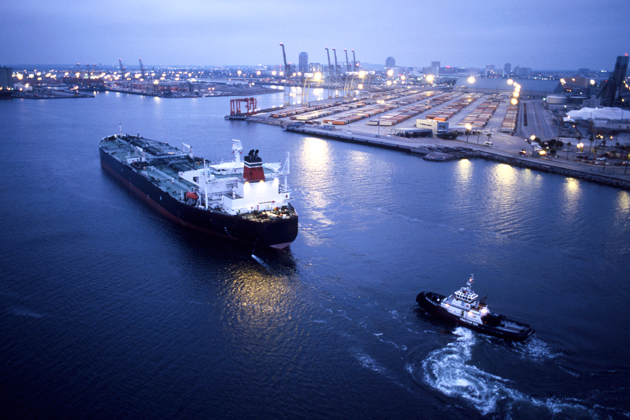Importers in Nigeria are now diverting cargoes to neighbouring countries to avoid undue restrictions at the country’s ports and high custom duties, a report has disclosed.
The Chief Executive Officer of the Financial Derivatives Company Limited (FDC), Mr. Bismarck Rewane, disclosed this in his monthly economic news and views for September presented at Lagos Business School recently. This, he attributed to higher customs duties, bottlenecks and forex shortages, adding that smuggling activities are expected to increase.
Clearly, this may jeopardise the federal government’s efforts to boost non-oil revenue following the fall in crude oil prices.
Nigeria is officially in an economic recession.
The National Council of Managing Directors of Licensed Customs Agents (NCMDLCA), recently identified lengthy and cumbersome documentation process on export, multiplicity of regulatory/security agencies, high and duplicated terminal/ shipping company charges and process and lack of export infrastructures as major obstacles that affect export process from Nigerian ports.
In a letter to the Executive Director of the Nigerian Export Promotion Council (NEPC) and copied President Muhammadu Buhari, the Nigerian Ports Authority (NPA) and the Nigerian Shippers Council (NSC), NCMDLCA had called on the federal government to take urgent steps to remove the obstacles before it is too late.
The letter signed by its National President, Lucky Amiwero alleged that: “ The federal government agencies duplicate the process of quality inspection with that of the appointed federal government pre-shipment inspection on export. This constitutes serious bottleneck due to lengthy and cumbersome process, procedure and cost, which resulted in attendant delays and high costs that prompted the movement of our product to our neighbouring West African Ports.”
On the duplication of charges by shipping companies, the customs agents said: “The Nigerian Shipping companies in line with the contract of carriage, handle import container that are loaded back to the country of origin as empty container without any charge due to the level of export activities that is still very low in the country. The shipping lines Terminal Delivery Charges (TDC) is a charge that is not tied to service, as such charge is duplicated in the charges of terminal operators. Their charges do not represent any service to exporters in Nigeria in any form.”
Continuing, Rewane in the report pointed out that ships awaiting berth decreased to 41 from 45 last month, adding that ships awaiting berth are expected to decline further.
According to the report, weakness in macroeconomic condition in the country has translated to profitability decline by most quoted companies. He said earnings and profitability fell short of expectations as investor confidence worsened.
For the banking industry, the report pointed out that 74.6 per cent of industry revenues in their recently released half-year results amounted to N1.21 trillion concentrated in tier I banks.
“Industry’s profitability is slowed by high loan loss charge offs and rising operating costs. Impairment charge continues to record high credit losses of N218.9 billion for first half of 2016, from N41.3 billion as at first half of 2014. Size matters as tier II banks struggles to grow profit before tax. Tier II profit before tax as at the first half of 2016 was N50.3 billion, as against the N59.2 billion recorded in the first half of 2014,” it added.
CBN is conducting stress tests as well as routine examinations on banks in the light of growing non-performing loans (NPLs) and deteriorating asset quality due to naira weakness.
This, the FDC boss said raises apprehension on the state of Nigerian banks as the last released financial stability report was for December 2015.
“The economy has found its bottom and the only way is up. But the pace of recovery is dependent on pace of policy response,” it added.
According to the report, the top four fastest growing sectors accounted for only six per cent of new jobs as at the first quarter of this year, adding that sector activity does not mean job creation and employment. It pointed out that growth does not translate into increased consumption and income.
In its review of the real estate sector, it showed that Lekki has the highest vacancy rate at 65 per cent, adding that affordable rents are six to 10 per cent above asking rents of $780psqm in Victoria Island.
Residential index rose by 6.8 per cent quarter-on-quarter as commercial index remained flat at 148. Prime office rent drop by six per cent to $810 per sqm per annum.
“Nigeria in recession increases vacancy rates further. Carrying cost of properties is excruciating as landlords reduce rental payment to annually. Previously, they used to collect two to three years payment. Pedigree of tenants remains important. Replacement cost far in excess of market value,” it stated.

 Naira4 weeks ago
Naira4 weeks ago
 News4 weeks ago
News4 weeks ago
 Naira4 weeks ago
Naira4 weeks ago
 Travel3 weeks ago
Travel3 weeks ago
 Jobs4 weeks ago
Jobs4 weeks ago
 Naira3 weeks ago
Naira3 weeks ago
 Naira3 weeks ago
Naira3 weeks ago
 Investment4 weeks ago
Investment4 weeks ago






























